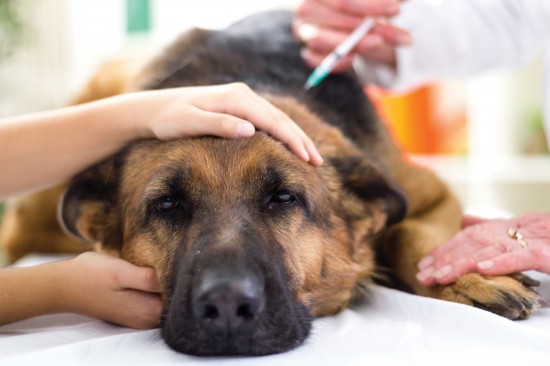

All responsible dog owners take their dogs along to the vet on an annual basis to get their dogs their essential booster shots, and ensure that they are protected against a wide range of dangerous and communicable diseases. However, all dog owners probably wonder at some point whether vaccines are actually fully effective in protecting against disease, and if the whole range of annual boosters, which can prove costly, are totally necessary.
There is also a movement known as the “anti vaxxers,” generally a term used to refer to people who believe that humans do not need vaccinations and that they are also sometimes harmful, who would have you believe that vaccines are at best a big, expensive con, and can at worst, actually harm your pet.
So, are there any downsides to vaccinating dogs, and does the anti-vaxxer movement raise any valid points? Read on to find out.
Vaccinations protect dogs against diseases that could potentially make them very sick or even kill them. While vaccination is not a 100% guarantee against the dog contracting a disease, it does reduce the likelihood of contracting the disease in question from any affected dog by a large exponential factor. Added to this, even if a vaccinated dog should be unlucky enough to pick up a condition that he has been vaccinated against, the vaccination will ensure that the disease will almost certainly be much milder than it would be in an unvaccinated dog.
Vaccinations have also gone a huge distance towards stopping or limiting the spread of the most common transmissible canine conditions, due to a principle known as herd immunity.
Herd immunity dictates that in any given population, if the majority are vaccinated, this even offers benefits to the few that are unvaccinated, as they are exponentially less likely to come into contact with any given disease. This means that vaccinated dogs can even help to protect total strangers, and dogs that are, for some health or allergy reason, unable to be vaccinated themselves.
As with any form of medical treatment or the administration of medicine, vaccination does have potential side effects and some risk factors. However, very few dogs will experience any side effects of vaccination at all, and of those that do, this is generally as minor as a little localised swelling at the vaccine site, potentially accompanied by a little soreness.
In some very rare cases, a dog may prove to be allergic to one of the components of the vaccine, which can trigger severe allergic reactions and sickness. However, this is incredibly rare. Dogs that have proven to be allergic to vaccines may be unable to benefit from vaccination in future, in which case, they largely rely upon the herd immunity mentioned above to protect them from disease.
The core of the debate against vaccinations is based on a couple of pivotal opinions: That the risk of sickness from vaccination is greater than the risk of the disease itself, that vaccines are not 100% effective, and that vaccines are an unnecessary con or rip off.
The reality of the situation, however, is that a dog is many hundreds of times more likely to become sick by catching a disease than they are by means of receiving a vaccine, and as mentioned earlier, the likelihood of a serious reaction to vaccination is incredibly small.
Many anti-vaxxers point out that their own pets have never been vaccinated and are all in good health; this is often the case, and can be hard to argue against. However, a large part of the rebuttal to this comes back again to the concept of herd immunity. Many more people vaccinate their dogs than refuse vaccines, meaning that previously common killer diseases are much rarer, and that the dog of an anti-vaxxer is simply a lot less likely to come into contact with a disease vector, thanks to the responsible dog ownership of other people.
The concept of vaccination may appear to be a very individual thing, or a personal choice for each dog owner. However, vaccination should not be seen as a standalone thing involving one dog and one vaccine; vaccination and the minimisation of various serious diseases relies upon the larger part of the population vaccinating, working to reduce the amount of chances for any given disease to be passed on. This keeps serious diseases from taking a hold in the canine population, and prevents them spreading across large areas and to many dogs. This means that weaker dogs and those that are not vaccinated also benefit from the way that vaccines curb the spread of any given disease.
If enough people stopped vaccinating their pets, serious and highly contagious conditions such as Parvovirus would run unchecked again through the canine population, causing high mortality levels and a generally weakened gene pool of dogs within the UK.
Copyright © 2005-2016 Pet Information All Rights Reserved
Contact us: www162date@outlook.com